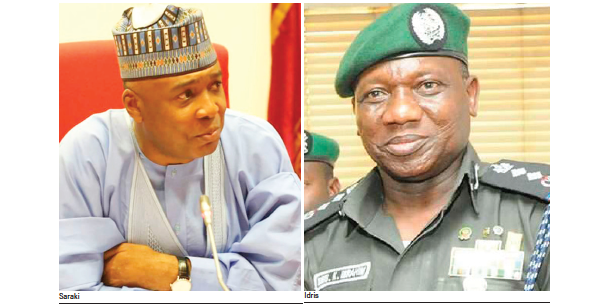The frosty relationship between the Inspector General of Police, Ibrahim Idris, and the Senate reached a new low on Wednesday, May 16, when Senate President Bukola Saraki accused the country’s chief law officer, of plotting to frame him up.
Saraki told his bewildered colleagues at plenary that Idris plotted to implicate him in murder cases. The move was unprecedented and the allegations grave.
Saraki claimed that Kwara State governor, Dr. Abdulfatai Ahmed, informed him that “a group of suspects who had been in police cells for several weeks for cult-related matters and whose investigation had been concluded with prosecution about to commence under the State law based on the advice of the Director of Public Prosecution (DPP) and the Ministry of Justice were ordered to be transferred to Abuja this morning,” on the orders of IGP Idris.
“The plan, as the governor was made to understand is that, under duress, the suspects would be made to alter the statements they already made in Ilorin. They will then be made to implicate the Kwara State Government, and in particular, myself, in their new statement.”
So alarmed were senators from across the political divides that they passed a resolution, constituting a nine-member committee to report the matter to President Muhammdu Buhari.
Expectedly, the Inspector General has reacted, warning Saraki against jeopardising murder investigations.
While denying the allegation, police spokesperson, Jimoh Moshood, threatened Saraki, literally.
“Until investigation is concluded, any person(s) or group(s) who tries to interfere in the investigation process by action or utterances is committing an offence,” he said.
This is unfortunate as the needless and ill-advised confrontation between Idris and the Senate portends grave danger to the country’s still fledgling democracy.
IGP Idris has carried on, particularly in his dealings with the National Assembly, as if he was above the law.
Such needless muscle flexing distorts fundamentally the workings of democratic institutions, corrodes discipline in the public service and basically destroys harmony between the different arms of the government.
The three arms of government – executive, legislature and judiciary – are not only equal but derive their powers from the constitution.
The framers of the 1999 constitution had no intention of subjecting any to the whims and caprices of the other.
Unfortunately, a tendency seems to be emerging, particularly in the last three years of the Buhari presidency, of the executive arm of government feeling superior to the other arms.
And Idris seems to have no qualms personifying this aberration with a catalogue of unbecoming conducts.
For instance, penultimate Wednesday, he refused to honour an invitation to appear before the Senate and brief the lawmakers on what the police are doing to stop the incessant blood-letting across the country.
That was the third time he was snubbing the representatives of the Nigerian people.
Angry senators responded by declaring him “an enemy of democracy” and someone “who is unfit to hold public office in Nigeria and abroad.”
The Senate first summoned Idris to appear before it on April 26. When he failed to do so, it fixed another date, May 2, for him to appear. When he again failed to do so, the Senate fixed penultimate Wednesday, May 9.
A day earlier, on May 8, Saraki and Speaker of the House of Representatives, Yakubu Dogara, met President Buhari and reported the matter to him.
On all three occasions Idris sent Deputy Inspector General of Police (Operations) Mr. Habila Joshack, to represent him, insisting that the 1999 Constitution, the Police Act and Regulations empower him to detail a DIG or an AIG to represent him at occasions.
Senate however turned Joshack back on each occasion and insisted on Idris coming himself.
The other question is whether Idris would have refused summons from the president.
In any case, the Senate has an ironclad reason to want to see the country’s top cop. The spate of killings across the country this year is unprecedented.
In other climes, the chief law officer under whose watch such atrocities were committed would have voluntarily retired or forced to do so.
The only reason why Idris remains the Inspector General of Police is because this is Nigeria and he has the backing of the Commander-in-Chief and president of the country.
What is playing out in this Senate-IGP saga is executive rascality. It is sad that a president who claims to be a convert to democracy is fanning the embers of this discord.
While it is true that the conduct of some senators in this dispensation is below par, that does not give the IGP the impetus to be contemptuous of the National Assembly, the country’s symbol of democracy. From what is currently happening, one wonders if Idris really understands the role of the police in a democracy.
In a democracy, institutions matter. The National Assembly must be accorded the respect it deserves because any disrespect devalues our democracy and it is an affront on the Nigerian people whose representatives the lawmakers are.
TheNiche strongly condemns the condescending disposition of the IGP to the National Assembly, particularly the Senate with the tacit support of the presidency.
Idris should understand that he is the Inspector General of the Nigerian Police whose allegiance should be to the Nigerian people and the Constitution and not the man who appointed him or the executive arm of government.
Even if he has issues with some members of the National Assembly, he has to wait till the next election for their constituents to vote them out.
By taking up this needless fight with the National Assembly, the joke is on the IGP.
It is a fight Idris cannot win and must climb down from his high horse because he has no right to mount the horse in the first place.
By publicly joining issues with the Senate, the IGP is punching way above his weight.
TheNiche strongly advises Idris to immediately appear before the Senate. That is the right thing to do. Anything other than that is bad behaviour which detracts from our democracy.














